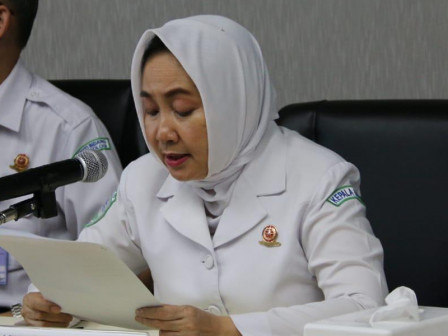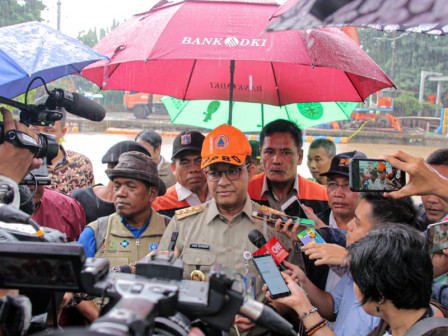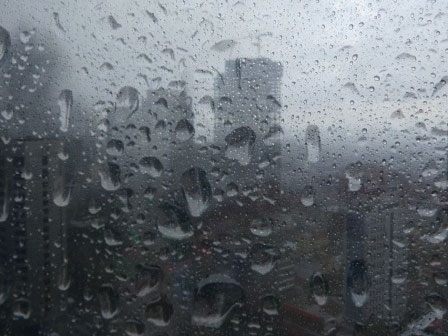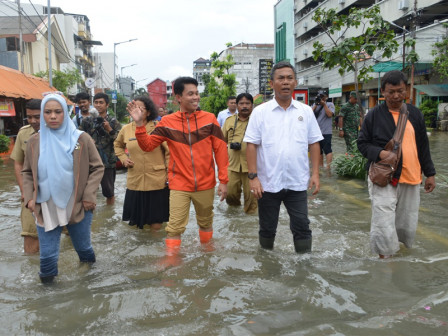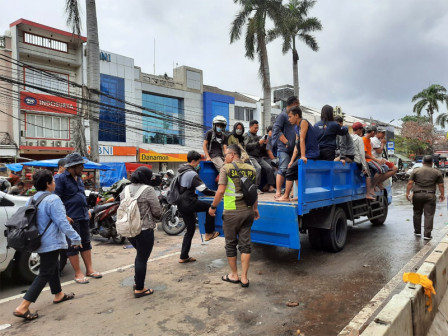BMKG Predicts Extreme Weather to Occur Until March 2020
Reported by Aldi Geri Lumban Tobing | Translated by
Meteorology, Climatology, and Geophysics Agency (BMKG) stated that extreme weather is potential to occur until March.
High moderate rain is potential to occur from February 24 to March 1, 2020 in Banten, Jakarta, West Java, Central Java, Yogyakarta, East Java
Based on the result of development analysis towards the dasarian rainy season II (second ten days) of February 2020, 100 percent of climate zones (ZOM)s in Indonesia have entered rainy season, including Greater Jakarta or Jabodetabek.
BMKG's Head, Dwikorita Karnawati stated, current atmospheric dynamics conditions indicate that regional-local scale factors contribute significantly to the extreme rain and weather patterns in Indonesia.
40 Shelters Provided to Facilitate Flood Victims"High moderate rain intensity occurred evenly in all Greater Jakarta regions today, from south to north with the highest rainfall intensity that reached 278 mm in Kemayoran on Tuesday (2/25) at 7 a.m.," she informed, Tuesday (2/25).
Besides, BMKG also monitored two tropical cyclones that affect Indonesian weather on February 24, 2020 namely Ferdinand Tropical Cyclone (981 hpa) in South Indian Ocean of NTB and Ex-Tropical Cyclone Esther in Northern Australia
"These tropical cyclones affect the high moderate rain intensity in Java, Bali, NTB, NTT, and high waves in southern waters of Indonesia. There is convergence formation that extends from West Java, Central Java, East Java to Bali, NTB, and NTT," she explained.
She assessed the extreme weather that occurred in Greater Jakarta in the past few days was predominantly triggered by local scale atmospheric dynamics factors, namely, the formation of convergence patterns (air mass meetings) and strong air liability conditions, especially in western part of Java, including Greater Jakarta.
"High moderate rain is potential to occur from February 24 to March 1, 2020 in Banten, Jakarta, West Java, Central Java, Yogyakarta, East Java," she added.
According to her, it needs intensive efforts in mitigation and adaptation to climate change, as well as improved coordination and synergy between stakeholders in handling flood disaster.
Her side recommended that water and environmental management should be integrated from downstream to upstream. Moreover, flood management should be in line with drought management in order to maintain water security during dry season.
"Rainfall accumulation in the upstream area is higher 1.4 times compared to the downstream area, thus water should be stored longer in upstream area. While extreme rainfall trend is more dominant in the downstream areas, thus water infrastructure system should be strengthened in these regions," she mentioned.
Her side reminds people to remain vigilant and be careful of floods, landslides, flash floods, inundation, strong winds, fallen trees, and slippery roads.
"BMKG provides 24-hour weather information that can be accessed through http://www.bmkg.go.id or follow @infobmkg," she closed.
